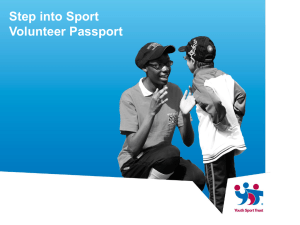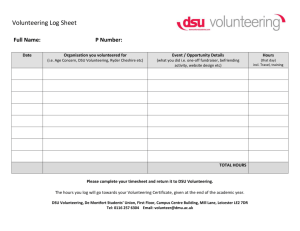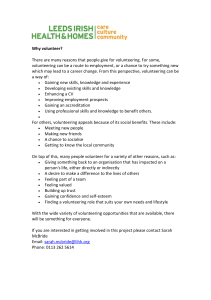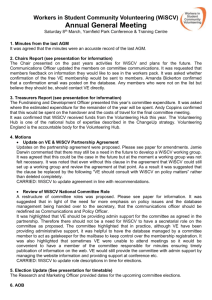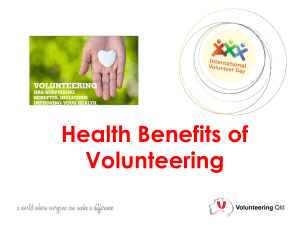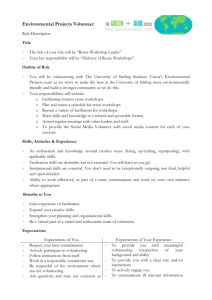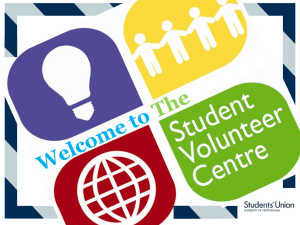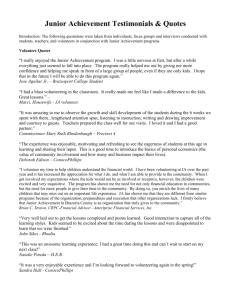The Do-Good Strategic Plan Template for: Non Profits
advertisement
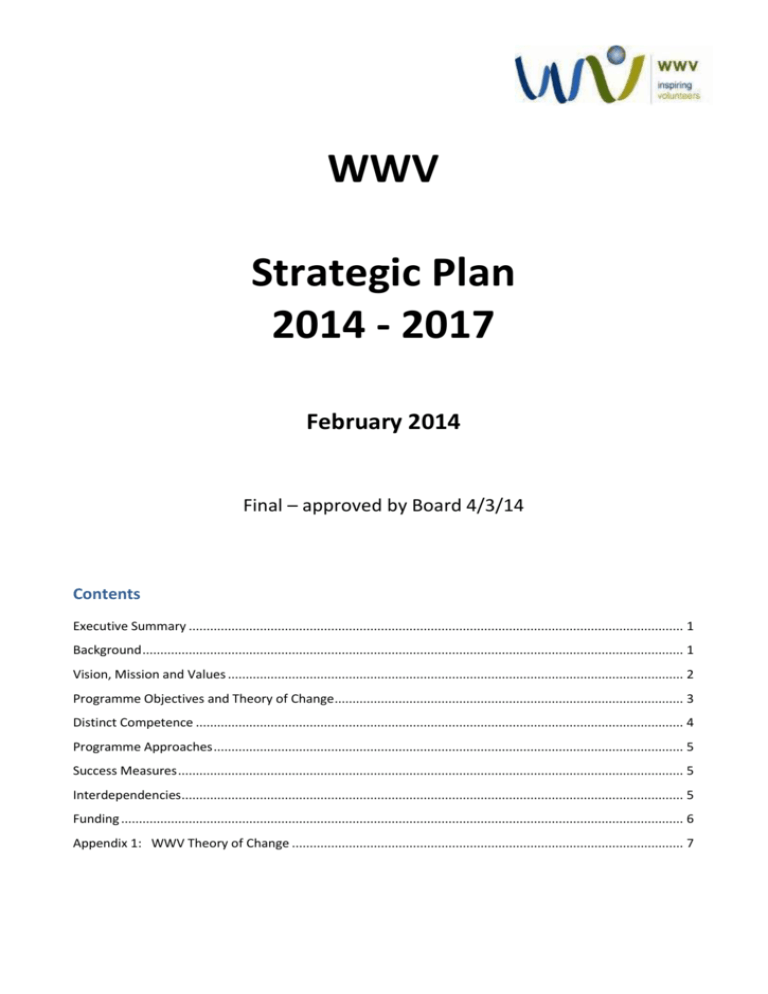
WWV Strategic Plan 2014 - 2017 February 2014 Final – approved by Board 4/3/14 Contents Executive Summary ........................................................................................................................................... 1 Background ........................................................................................................................................................ 1 Vision, Mission and Values ................................................................................................................................ 2 Programme Objectives and Theory of Change .................................................................................................. 3 Distinct Competence ......................................................................................................................................... 4 Programme Approaches .................................................................................................................................... 5 Success Measures .............................................................................................................................................. 5 Interdependencies............................................................................................................................................. 5 Funding .............................................................................................................................................................. 6 Appendix 1: WWV Theory of Change .............................................................................................................. 7 Executive Summary WWV believes in the power of voluntary work as a catalyst for change – in individuals, organisations and society as a whole. We aim to support people of all ages and backgrounds to volunteer, enabling some of the most disadvantaged people in the UK to find meaningful voluntary work which builds skills, confidence, self-esteem and most importantly, enables people to re-connect and engage in and with their local communities and the wider world. This strategy outlines WWV’s key aims and direction for the next 3 years, specialising in the use of tailored volunteering opportunities to enable people at risk of being marginalised to take control of their lives and expand their horizons, and building on our successful legacy in schools to promote and increase volunteering and social action across the UK. We believe that our programme model is unique in the UK, and that WWV has a niche role to play and an opportunity to establish ourselves as the leading organisation in the UK using volunteering as a vehicle for change with people in need of intensive support. Over the life of this strategy we aim to expand the reach and coverage of our programmes, further improving our cost effectiveness and footprint. We seek to increase national recognition of our programme model – highlighting how the right volunteering placement can be a key component of holistic support provided to those in need of support to reconnect and re-engage with society. To deliver this strategy effectively, WWV needs to expand and diversify our funding base, increasing the profile of the work that we do, and building the solid evidence base to demonstrate the impact, outcomes and effectiveness of our programmes, all of which are crucial to attract new donors and project partners, and to keep our existing donors interested and engaged. Background WWV operates from a small Head Office in Somerset, providing support to clients through a team of dedicated staff based across the UK. There are no geographic limitations to where we will work – the main limiting factor only being the funds required to operate. WWV was created in 1994 to promote the positive impact of volunteering on individuals, organisations and society as a whole. Much of our early work in schools focussed on informing, encouraging and inspiring young people to engage in voluntary work - helping them to expand horizons, break down barriers, and develop a sense of belonging in the community, in addition to bringing benefits to personal well-being and employment prospects. Since 2008, in response to identified need and gap in provision, WWV’s work has shifted to cover a range of disadvantaged people, using volunteering to increase integration into communities and improve well-being and employment prospects. Our programmes have focussed on ex-offenders; disadvantaged young people and their families, including those leaving care, young care-givers, those struggling with drug and alcohol misuse, and those with disabilities; and wounded, injured and sick service personnel and veterans. Although the backgrounds and situations of these people can be very different, many of the challenges they face are similar. These can include low selfconfidence, self-esteem and resilience; low education/life skills; lack of support mechanisms and social networks; lack of motivation; poor communication skills; lack of career path and understanding of options available; mental health problems, anxiety and depression; experience of offending and substance misuse; and disengagement from community and society. Working with established referral organisations in each sector, we target people for whom volunteering could provide a route out of their current situation and produce real, sustainable, life change. Over the past few years we have had a number of successes. Through our schools programme we have worked with over 1,000 schools across the UK, introducing volunteering to over 200,000 young people directly, and inspiring them to get involved. Our volunteering database, launched in WWV Strategic Plan 2014 - 2017 Page 1 of 7 1994, has grown to over 3000 organisations with access to 1.9m opportunities per year for people of all ages and backgrounds. The rapid growth of our programmes working with specialist groups has established WWV as a leading organisation in the use of volunteering as a catalyst for change. From 2008 to 2012 we successfully managed the Vodafone World of Difference programme, enabling 1,227 unique charities over the four years to increase their impact through increased staff and volunteer capacity. Whilst funding is always a challenge, WWV has managed to maintain a solid base of committed trusts and individuals who have provided sufficient financial resources to build and expand our programmes. Vision, Mission and Values This strategy outlines WWV’s key aims and direction for the next 3 years, specialising in the use of volunteering to enable people at risk of being marginalised to take control of their lives and expand their horizons, and building on our successful legacy in schools to continue to promote and increase volunteering and social action across the UK. Our Vision Our vision is a UK where everyone who wants to be, is engaged in their community, and is inspired and supported in realising their potential. Our Mission Our mission is to enable people of all ages and backgrounds to take positive action to change their lives and the lives of others through volunteering. Our Values Our Values – Inspiring, Empowering, Valuing, and Integrity, Quality and Passion – have been the basis for WWV’s success. These are the behaviours we will hold ourselves accountable to, and against which we wish to be judged as we deliver our Mission: W Our values – what we are like Inspiring: We are innovative and forward looking, striving to be dynamic and an inspiration to others Empowering: We focus on peoples’ strengths and potential, and encourage autonomy and responsibility WWV Strategic Plan 2014 - 2017 Our behaviour – examples of what our values mean in practice We seek to infuse our clients with a sense of what they can do to make a positive difference to their lives and to their communities. We show the reality of how volunteering really can change people’s lives and make a positive contribution to society. We match people to projects which meet their interests and which inspire them. We are alert to changes in need, and are prepared to challenge ourselves and the way we do things, adapting as necessary to ensure we achieve our objectives. We will pilot innovative projects, and be passionate about communicating and celebrating successes so they can be taken further by others. We seek to provide our clients with the ability, strength and confidence to move their lives forward in a positive way. We promote a positive working environment, encouraging and supporting our staff to operate with autonomy and take responsibility for their work, enabling them to work effectively and efficiently. We treat all our clients as individuals, tailoring support to meet their needs not ours or those of our funders. We treat staff, beneficiaries and programme partners transparently and with fairness and respect. Page 2 of 7 Valuing: We value our staff and our clients, and promote diversity in our workplace and in our thinking Integrity: We act with integrity, being open and honest in everything we do Quality: We are committed to ensuring quality in everything we do Passion: We are passionate and dedicated to ensuring the positive impact of our work We aim to nurture a culture of mutual respect and a solid commitment to the belief that everyone has talent which should be nurtured. We value the contribution others can make, and we take time to consult and listen to their views. We promote diversity and equality of opportunity for our staff and beneficiaries alike in an open and fair way. We do not discriminate or judge anybody regardless of what their circumstances might be. We are consistent in our approach, and we will identify and attempt to overcome barriers to equality whenever they appear. Our relationships with our clients and partners is based on honesty, openness and mutual trust. We are realistic about what is achievable, working with clients to set realistic goals and targets. We always consider the impact of our work on the community around us. We set high standards for ourselves in terms of service delivery. We make the best use of the resources available to achieve our goals in a cost-effective manner. We prioritise the quality of our work over quantity. We strive for excellence in everything we do – reflecting on what we have done and learning in order to improve We take pride in our work, we value our organisation and each other. We are dedicated and put maximum effort and care into all our relationships with clients. We are able to adapt to the needs of the clients we work with, allowing us to provide the most appropriate support, We all take responsibility for our own actions, share ideas and complete actions which are set without relying on other people. Programme Objectives and Theory of Change WWV’s theory of change is attached in Appendix 11. The theory of change articulates the longterm outcomes which we are seeking for our beneficiaries, and the activities and intermediate outcomes of our programmes. The long-term outcomes are reflected in our programme objectives, which are to: Support disadvantaged and vulnerable people to re-connect and engage in and with their local communities through volunteering Improve mental and physical well-being and resilience of disadvantaged and vulnerable people through volunteering Support the transition to employment or education for disadvantaged and vulnerable people through volunteering Promote the benefits of volunteering and enable active participation in the community for people of all ages and backgrounds 1 The theory of change in Appendix 1 encompasses all of WWV’s work. However, more detailed theories of change are also available for each of our individual programmes, focussing on specific beneficiary groups WWV Strategic Plan 2014 - 2017 Page 3 of 7 The majority of the theory of change is focussed on the impact on each of the individuals with whom we work – our beneficiaries. Although we have not placed a focus on the outcomes at the community or wider society level in the theory of change, WWV also believes that our work has a wider impact on society in three main ways: Volunteering is a crucial part of today’s society, providing large economic and social benefits. Although a high percentage of people in the UK volunteer2, there are still a significant number of people who are excluded from most volunteer programmes – by working with those who are hard-to-reach, we are increasing the overall number of people volunteering, and hence increasing the economic and social benefits to local communities and society as a whole; Whilst young people increasingly recognise participation in volunteering as an opportunity to stand out and develop valuable skills needed for employment, and volunteering itself has been shown to significantly increase well-being and life satisfaction3, volunteering also helps people to understand themselves and their role as a member of a wider community. We believe that engagement in volunteering instils a sense of responsibility which can last a lifetime, and helps to break down barriers and differences between people, with huge benefits for society as a whole. By reducing the number of people who are, or who feel, excluded from society, we are contributing significantly – both economically and socially. For each offender who re-offends, for each disadvantaged young person who cannot enter the workforce, for each person who needs support for mental health problems, the cost to the taxpayer is substantial. Using volunteering as a way to bring people into mainstream society, to reduce anti-social behaviour, or to increase employability, brings significant benefits to all. Distinct Competence WWV’s approach is to work with clients for as long as they want us. In working with some of the hardest-to-reach members of society, it is vital to take time to build a relationship of trust, and place the emphasis on the quality and intensity of the 1-1 support we provide, rather than in chasing quantitative targets. Our 1-1 support includes a real focus on exploring the individual’s needs, aspirations, abilities and, fundamentally, choice, to ensure that we are matching people with opportunities which are going to challenge and stretch them whilst enabling them to grow and flourish. The personal relationship between the VPM, the individuals that we are supporting and the opportunity providers is a huge factor in the success of our interventions. No other organization working with our clients embraces such a relationship in their operating procedures. WWV works through a team of Volunteering Project Managers, who have the expertise in working with the specific client groups, but who are also rooted in the local communities – maintaining networks of local charities and organisations who can engage volunteers in meaningful projects, and who can provide the necessary support to vulnerable clients Building on our legacy in schools, we also have a huge amount of expertise in inspiring, encouraging and motivating people to volunteer – helping them to understand not just the benefits to the organisations and communities they work with, but also the benefits to themselves – how they can learn and develop, as well as demonstrate a work ethic, reliability and teamworking to prospective employers. To help people to research their own volunteering opportunities, we also maintain an online database with access to more than 1.9 million volunteering opportunities in the UK and worldwide. 2 In 3 2012-13, 72% of the population of the UK volunteered at least once Source: Cabinet Office analysis of Community Life Survey, August 2012-April 2013 WWV Strategic Plan 2014 - 2017 Page 4 of 7 Programme Approaches During the life of this strategy, WWV will increase our focus on monitoring and evaluation of our programmes, to ensure that we can show robust evidence of impact and outcomes for our beneficiaries. This will include ensuring that we have systems in place to listen to the voices of our beneficiaries and feeding in to programme development. It will also include commissioning of external evaluations where possible, to ensure we are getting objective feedback from outside of WWV. We will also increase our efforts to integrate our programmes, and explore opportunities for programmes to add value to each other – for example using clients from our military personnel rehabilitation programme to support work with disadvantaged young people or ex-offenders. We will also increase efforts to expand the number of active volunteers who support programme delivery, and explore how volunteers can be used to extend the scope and reach of our programmes. Success Measures Key objectives and milestones for WWV over the next year are defined in Appendix 4. However, we have also defined a set of broad success measures for WWV over the course of this strategy: Strategy: Relevant and ambitious plan in place which defines WWV’s place and added value in the volunteering sector, and responds to the needs of our beneficiaries Our Work Outcomes: Clear outcomes and impact are delivered through our programme portfolio Delivery: Programmes are delivered against plan and in line with budget Monitoring & Evaluation: Clear evidence of change for beneficiaries is documented and attributable to WWV activities Profile: WWV is well-known and respected in the volunteering sector in the UK Finance: Effective and efficient management of finances Our Organisation Funding: Programmes are fully funded through a mix of restricted and unrestricted funds Cost effectiveness: Resources deployed efficiently and effectively to maximize outputs Staff: Performance and satisfaction maximized through efficient support and management Legal: WWV is fully compliant with legal obligations and has appropriate policies in place Risk: WWV has taken appropriate steps to identify and manage relevant risks Interdependencies WWV cannot work in isolation. Volunteering is now acknowledged as a stepping stone to rehabilitation and forms part of a holistic service; this frequently includes housing, drug and alcohol assistance, mental health, education, job seeking etc. It is therefore crucial that WWV works alongside other service providers to ensure our efforts are joined up with the work of others, to maximize the chances beneficiaries have of making lasting changes to their lives. Close partnerships in all sectors are also crucial for stimulating appropriate referrals of clients who will benefit from our services. Key partners for programme delivery throughout the life of this strategy will include prison and probation services, local councils, key charities such as Help for Heroes and Action for Children, and Government agencies such as the Ministry of Defence, and the Department for Education. WWV Strategic Plan 2014 - 2017 Page 5 of 7 In addition, WWV could not exist, of course, without our portfolio of loyal and generous donors. It will remain of the highest importance for WWV to communicate effectively with our supporters, to understand their needs and requirements, and to help them to understand the impact and effectiveness of our programme model. Funding To deliver this strategy effectively, WWV needs to continue to raise funds, and expand and diversify our funding base. Over the past few years we have developed an extensive donor base of trusts, foundations and individuals whose support has enabled us to deliver, develop and adapt our programmes to meet the needs of our beneficiaries. It is crucial that we are able to keep our donors interested and engaged, and an increased focus on demonstrating the impact and outcomes of our programmes is critical to doing this. Diversification of income is also important – over the course of this strategy WWV will endeavour to increase engagement with and funding from the corporate sector, explore opportunities for developing business models which bring in earned income, and increase our funding from statutory sources. We believe that the volunteering database that we have worked hard to build up over the past 20 years is a key asset and a fundraising tool, and we will be exploring ways to use the data within it to bring in income for our programmes, through sponsorship, advertising, white labelling and partnerships. In addition, we need to increase the profile of the work that we do – to build on the inspiring case studies we have built up, and demonstrate to others the power that volunteering can have in helping people to turn their lives around. An increased focus on marketing and communications during the life of this strategy will be extremely important to help us position ourselves as the leading organisation in this field, which in turn will help us to bring in new sources of funds. WWV Strategic Plan 2014 - 2017 Page 6 of 7 Appendix 1: WWV Theory of Change Long-term Beneficiary Outcomes: Better integration into communities Improved mental and physical well-being Long-term Societal Increased transition to education/employment Outcome: Intermediate Beneficiary Outcomes: WWV Activities: Grit and determination Family & social relationships Body language Social and pro social networks Attendance & time-keeping Levels of empathy Levels of anxiety & depression ATTITUDES More positive attitude, more confidence, and greater sense of responsibility as a member of community Improved personal appearance Confidence, self-esteem Autonomy and control Willingness to engage with others Attitude and motivation to work Aspirations LIFE SKILLS Improved ability to take ownership of decisions and practical steps to access services to enhance lives Use of IT / information resources Engagement with services Interview skills Competence in form-filling Ability to access services Community involvement EMPLOYABILITY Improved ability to move into paid employment or education Team-working/cooperation skills IT and technical skills Problem-solving skills Self-management skills Work experience Job / training search skills Presentation to employers Support in volunteer placement and mentoring to progress to education or employment Support to find volunteering opportunities Support to apply for a regular voluntary placement Individual support including guidance, coaching, communication and social skills Tailored matching, advice and support to identify appropriate community volunteering opportunities Support to develop social action projects Promotion of volunteering Inform, encourage and inspire clients to explore the potential of volunteering Beneficiary Groups: Wounded, Injured and Sick Ex-Servicemen and Women Disadvantaged Young People & their families Ex-Offenders Other Vulnerable People Young People in Education Increased recognition of the value of volunteering to individuals, to organisations, to communities and to society as a whole Example Indicators: PERSONAL SKILLS Improved self-awareness, emotional intelligence and resilience, and ability to communicate effectively with others Increased community engagement and social action Page 7 of 7
